Company details for:
Evolve Training
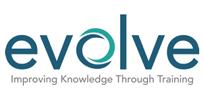
Wellheads Crescent,
Wellheads Industrial Estate,
Dyce,
Aberdeen,
Aberdeenshire,
AB21 7GA,
United Kingdom
Quick Links:
Products / Services
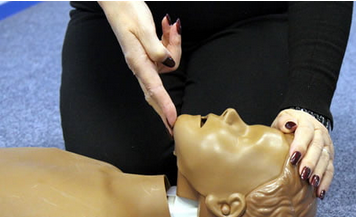
First Aid at Work Courses
First Aid at Work course run every week. Evolve ensures accessibility to vital knowledge that could make a difference in any setting be it work, home, or leisure. The approval and recognition from the esteemed awarding body, Qualsafe Award, underscore the credibility of the training offered.
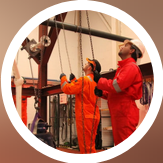
Rigging & Lifting Courses
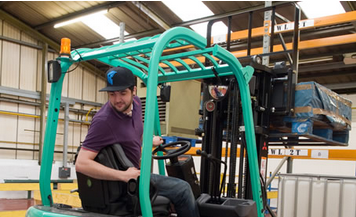
Forklift Courses
The flexibility in training extends to the types and sizes of forklifts covered, providing basic training, conversion courses, and refresher courses. These sessions can take place either at the accredited Evolve Training center in Aberdeen or directly at the customer’s premises, ensuring convenience and accessibility.
Recognizing the importance of industry standards, Evolve Training holds accreditation from ITSSAR (Independent Training Standard Scheme and Register), underlining the commitment to delivering high-quality, standardized training.

Representative of Employee Safety in the Workplace

Personnel Development Courses

1-Day Train the Trainer

NEBOSH National General Certificate
The qualification is:
Relevant to every workplace
Ideal for managers, supervisors, or anybody with health and safety management responsibilities
Perfect for those embarking on a health and safety career
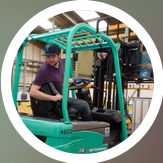
Counterbalance Forklift Truck - Semi Skilled B1 up to 5 ton
To provide operators, who have significant prior experience of operating forklift trucks but have not had formal training or certification, with sufficient skills and knowledge to carry out their duties safely and efficiently whilst operating forklift trucks in the workplace.
The training is carried out to a standard accredited by ITSSAR (Independent Training Standards Scheme and Register) in line with HSE expectations as laid down in L117
(Approved code of practice for Rider Operated Lift Truck Operator Training).
Accredited forklift training now requires all candidates to be registered with a governing body. This is required for companies whose forklift operators work on their own and clients sites and require a national certificate.
Evolve Training will register all our candidates with ITSSAR under the TOPS (Trained Operator Passport Scheme). ITSSAR TOPS Registration costs £15.00 plus VAT per candidate and this is included in the price of the training.
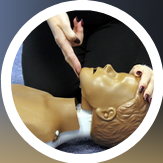
Emergency First Aid at Work
On completion of training, successful candidates should be able to understand the role of the first aider including reference to:
The importance of preventing cross infection;
The need for recording incidents and actions;
Use of available equipment;
Contents
Assess the situation and circumstances in order to act safely, promptly and effectively in an emergency;
Administer first aid to a casualty who is unconscious (including seizure);
Administer cardiopulmonary resuscitation;
Administer first aid to a casualty who is choking; including practical
Administer first aid to a casualty who is wounded and bleeding including catastrophic bleeding
Administer first aid to a casualty who is suffering from shock;
Provide appropriate first aid for minor injuries (including small cuts, grazes and bruises, minor burns and scalds, small splinters, insect stings and animal or human bites.
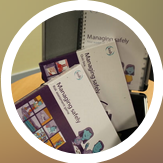
IOSH Managing Safely
To ensure those personnel required to manage safely and effectively, do so in compliance with both their organisation’s policy and best practice in health and safety.
Contents
Safety management systems, the role of risk assessment and how safety management links with other aspects of management.
Reactive monitoring, including which incidents have to be reported etc.
Risk assessment and risk control, including making an inventory of sources of hazards, identifying hazards associated with each source
Preparing and using active monitoring checklists and implementing schedules for active monitoring
Organising and conducting safety management reviews
Identifying relevant legislation and obtaining advice or guidance
Managing the sources of hazards addressed in Working Safely
This three-day course is approved by IOSH and the syllabus can be tailored to meet the specific conditions of the delegate’s industry.
Examination − A written assessment and practical risk assessment will be undertaken at the end of the course 60% or more must be achieved in both to entitle the candidate to receive a Managing Safely certificate issued by IOSH.

Mental Health First Aid
To equip the Mental Health First Aider with a wide range of skills and knowledge so that he/she can competently recognise when someone is suffering. Upon successful completion of this course, a Qualsafe approved Mental Health First Aid at Work certificate will be awarded (valid for 3 years).
Contents
This course is broken down in to 4 parts, with each part taking half a day to complete. All 4 parts are essential in gaining a useful and coherent understanding of mental health in the workplace.
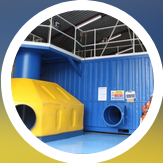
IOSH Approved Confined Space Entry - 2 days
To provide delegates that may be exposed to working in a confined space the information and training that will enable Confined Space Entry to be carried out in a safe manner.
The course will identify the potential hazards of confined space access and egress and how to manage those hazards, through administration controls and practical exercises.
A “confined space means any place, including any chamber, tank, vat, silo, pit, trench, pipe, sewer, flue, well or other similar space in which, by virtue of its enclosed nature, there arises a foreseeable specified risk” (Confined Space Regulations 1997).
Content
Legislation specific to confined space work
Management/Supervisory duties under the Regulation
Safe systems of work − Permits to work
Atmospheric testing, monitoring and deterioration
Properties of gases
Required Safety Equipment
Standby personnel roles and responsibilities
Using Self-Contained Breathing Apparatus (SCBA)
Emergency Rescue Awareness
Written assessment
Practical Assessment
Practical exercises using the ‘Restricted Access Trainer’ including the preparation and use of breathing apparatus (SCBA), winches and rescue equipment.
Practical exercises can be tailored to simulate the working environment of the delegates as long as this has been agreed prior to the course start.
Due to the nature of the course, delegates must be medically fit, and will be required to complete a written health and fitness statement prior to the course.
And over the age 0f 18 to attend this course.
This course is approved by IOSH.
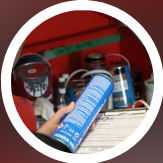
COSHH Assessor Courses
To enable all personnel who are responsible for the management and conducting of COSHH assessments in the workplace to recognise the requirement for a COSHH assessment, and for them to carry out these assessments methodically and in conjunction with current legislation.
Contents
COSHH awareness
Principles of assessments
Gathering information on the substance, the work and working practices
Evaluating the risks to health
Action required
Control methods
Recording the assessment
Reviewing the assessment
Practical assessment exercises
Written assessment
Legislation including:
Control of Substances Hazardous to Health Regulations 2002
Classification Label and Packaging Regulations 1994
Management of Health and Safety at Work Regulations 1999
Personal Protective Equipment Regulations 1992
Occupational Exposure Limits EH40
Material Safety Data Sheets (MSDS)
This course contains a number of assessments to be completed by the delegates enabling them to carry out process based COSHH assessments in their workplace to meet the requirements of the Regulations.
Delegates may bring their own company COSHH assessments and safety data sheets as a reference aid.
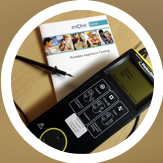
Portable Appliance Testing - PAT Testing Courses
The delegates receive classroom based instruction covering the relevant elements of legislation. This will be followed by practical demonstrations in a workshop environment.
Legislation (HASAW, PUWER, Electricity at Work)
IEE code of practice
Classes of electrical equipment
Types of test
Methods of testing
In service testing
Combined inspection & testing
Recording of testing
Frequency of testing
Practical demonstrations
Practical assessment
Written assessment
In order to receive a “Portable Appliance Tester” certificate all candidates must pass both the practical and written (multiple choice) assessments conducted at the end of the session. Candidates for this course do not require to be qualified electricians but, basic electrical skills are required in order to successfully complete the course.
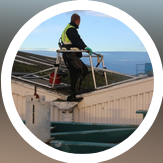
Working at Height Courses
This one-day course introduces the principles and equipment involved in working at height and, through a combination of classroom and practical demonstrations, the process of a safe and systematic approach to working at height operations. This course will benefit all personnel that conduct operations that involve working at height.
Content
Classroom instruction on the following:
Current Legislation
Hierarchy of Risk
User requirements when working on scaffolding
Use of Work Platforms & MEWP’s
Anchor selection
Fall Arrest, work restraint, work positioning
Personal Fall Protection Equipment
Ladders, Stepladders and Hop-ups
Working on roofs
Equipment Inspection
Fragile Surfaces
Rescue overview
Risk Assessment Principles
All delegates will participate in practical exercises involving pre & post-use inspection and the safe use of a variety of working at height equipment.
The course involves climbing ladders and using working at height equipment, therefore delegates should be physically fit to carry out the practical exercises.
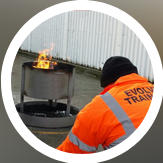
Fire Warden Training
To provide employees with the knowledge required to undertake their role as Fire Wardens, and to enable them to select the correct First Aid Fire Appliance (FAFA) if required to put out a fire in its’ early stages:
Contents
The Role of the Fire Warden.
Fire Legislation.
How fire spreads.
The chemistry and characteristics of fire.
Fire Risk Assessment.
Fire Hazards.
Fire Prevention and control measures.
Classes of fire and fire equipment.
Emergency lighting and means of escape.
Action in the event of fire.
Practical exercises “Fire Warden inspections” and “Extinguishing a live fire”.
Written test.
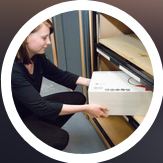
Manual Handling Skills Training
To give all personnel the required knowledge and skill, so that they can undertake occupational manual handling activities at minimum risk to themselves and others. This will include consideration of peripheral issues such as access arrangements, area layout, environmental influences and slips, trips and falls.
Contents
Classroom instruction on the following:
• An overview of relevant legislation
• Consideration of the implications of injuries associated with manual handling incidents
• Correct manual handling techniques
• The construction of the human frame and the health issues that can arise out of poor
manual handling technique
• Risk assessment techniques as they relate to manual handling
• Practical instruction and delegate participation in lifting and handling techniques
The practical work benefits greatly from being conducted in a representative work area. A
dynamic assessment of the client site can be carried out and appropriate solutions can be
discussed. This approach benefits both the delegates and the client company, often identifying
areas, which need to be addressed in addition to simple training activity.
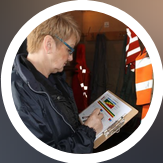
Risk Assessment Training
To give all personnel an understanding of the causes of accidents in the workplace and the action that is required both in the long and short term to minimise the effects of such accidents/incidents. To enable delegates to identify actual or potential hazards in the workplace, and to assess the risk from these actual/potential hazards, in order for them to initiate an action plan to minimise the dangers from them. Ensuring that delegates understand the important points of law affecting accident prevention and explain some of the effects and consequences of legislation.
Contents
Legislative requirements
Main reasons for assessing risks
Estimating risks
Applying a control measure hierarchy to control risks
Safe Working Procedures
Conduct assessment and produce Safe Working Procedure
Candidates will be assessed to establish that they are competent to conduct a generic risk assessment.
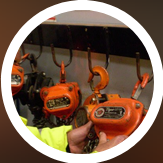
Lifting Gear Inspection including Rigging Loft Management
Contents
Classroom instruction on the following:
Legislation
Construction, maintenance and inspection of:
Wire rope slings
Polyester web slings
Round (endless) slings
Shackles, eyebolts, hooks, turnbuckles
Plate clamps
Chain blocks / pull lifts
Tirfors
Beam clamps
Sheaves (snatch) blocks
Pad eyes
Lifting gear register
Practical assessment
Delegates are required to carry out thorough inspection of the above items from a black museum.
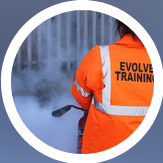
Fire Extinguisher Training
To provide candidates with a basic knowledge of the causes and spread of fire, how to identify and select the correct First Aid Fire Appliance (FAFA) for dealing with fire and how to operate it correctly while maintaining personal safety.
Contents
Fire Safety Legislation
Theory of combustion (fire triangle)
Causes of fire and how it spreads
Fire prevention and control measures
Classes of fire
Types of extinguishers and their uses
Action in the event of fire and personal safety
Practical exercises using fire extinguishers if the course is held on our premises
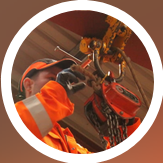
LOLER Planner
To ensure that supervisors and persons responsible for carrying out assessments have the skills to analyse the tasks of the workforce and are able to carry out assessments methodically.
Contents
Classroom instructions
What are the LOLER regulations and how do we apply them
How do they affect us
The link between LOLER and PUWER
Applying a suitable risk assessment
Identify equipment and operations
When and how to write and review a method statement
Organising and initiating and action plan
Written paper
Practical
Carry out a risk assessment
Plan a lifting operation
Assess various lifting plans

Abrasive Wheels Training
To impart the knowledge of the regulations and skills necessary for the safe use and mounting of abrasive wheels and reduce the risk of accidents. This course has been designed to provide formal training for those responsible for maintaining abrasive wheels and associated equipment.
Contents
Classroom instruction on the following:
Legislation
Hazards arising from the use of abrasive wheels
The marking of abrasive wheels, as to type and speed
Storing, handling and transportation
The function of all components used with abrasive wheels
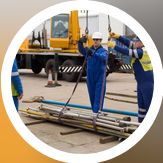
Banksman / Slinger Training
To instruct persons involved in basic slinging and crane lifting operations to guide crane operators by hand and radio signals, in both good and restricted visibility, and to safely carry out basic slinging procedures.
Content
Classroom instruction on the following:
Legislation of lifting appliances and gear
Responsibilities of the Banksman
Basic crane appreciation
Crane hand and radio signals
Safe and correct methods of slinging
Use of tag lines
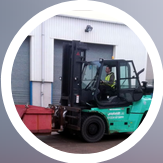
Forklift Truck Operator Conversion
To provide semi-skilled operators of forklift trucks who have received formal training and are in possession of a Certificate of Basic Training, and to update existing knowledge and skills to safely and efficiently carry out their duties on a different machine, i.e. B1 to B2 or B2 to B3.
This training is carried out to a standard accredited by ITSSAR (Independent Training Standards Scheme and Register) in line with HSE expectations as laid down in L117 (Approved Code of Practice for Rider Operated Lift Trucks Operator Training).
Accredited forklift training now requires all candidates to be registered with a governing body. This is required for companies whose forklift operators work on their own and clients sites and require a national certificate.
Evolve Training will register all our candidates with ITSSAR under the TOPS (Trained Operator Passport Scheme). ITSSAR TOPS Registration costs £15.00 plus VAT per candidate and this is included in the price of the training.
About us
The training centre in Inverurie has been a catalyst for growth. Evolve quickly broadened its range of safety courses, spanning from Confined Space to Forklift training, solidifying its position as a leader in safety education.
A crucial turning point occurred with the establishment of the Aberdeen Confined Space Training unit, propelling Evolve to the forefront in Oil & Gas, Utility, Construction, and Emergency Services sectors. Following this success, Forklift training emerged as our subsequent avenue for business growth and has become our most sought-after course to date.
Celebrating its 30th anniversary, Evolve has attained its present position with a wealth of staff expertise.
Our Health & Safety Courses Include:
NEBOSH National General Certificate
An acknowledged safety certification designed for managers and individuals seeking a fundamental grasp of occupational health and safety.
IOSH Managing Safely Qualification
This serves as an excellent introductory course for supervisors, managers, and directors looking to acquire a health and safety qualification in the workplace.
Mental Health First Aid Course
Given that 1 in 4 individuals in the UK is likely to encounter mental health challenges annually, it is crucial that everyone in a workplace can openly discuss and share the difficulties they may be facing.
Our Train Course Categories Include:
- Confined Space
- Environmental
- Fire
- First Aid
- Forklift
- Lifting Operations
- Personal Development
Addressing the increasing need for expertise, the shifts from Inverurie to Kirkhill and the acquisition of the Wellheads Industrial Estate Headquarters signified strategic progress.
Enter the vibrant present training centre − an educational hub. Practical training spaces, 14 rooms, and accessible parking collectively foster an environment conducive to the flourishing of knowledge.
Evolve Training proudly associates with well-respected awarding bodies, each demonstrating a dedicated commitment to excellence in health and safety education.
Images




































